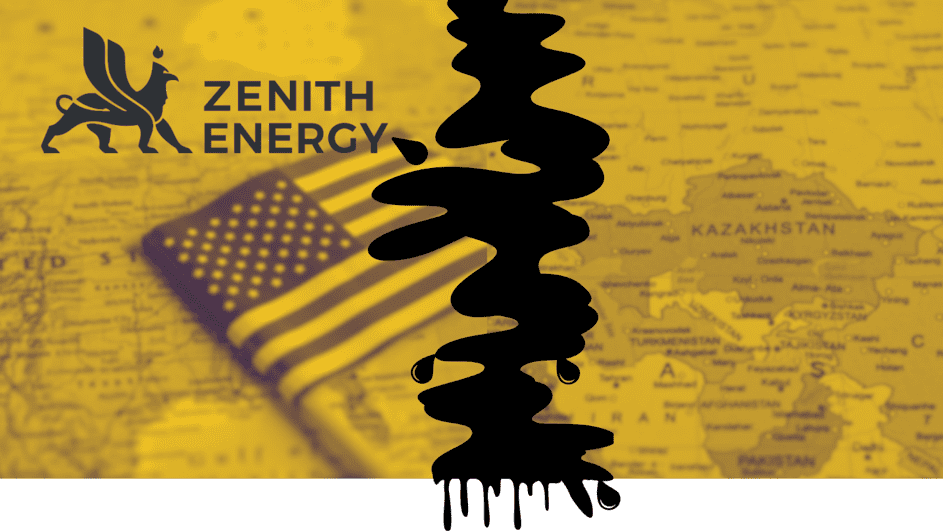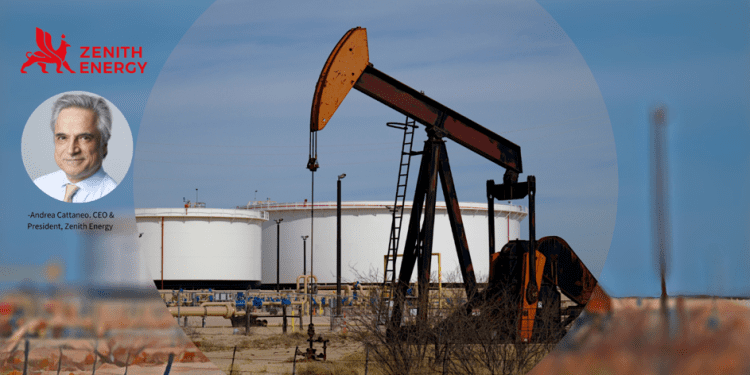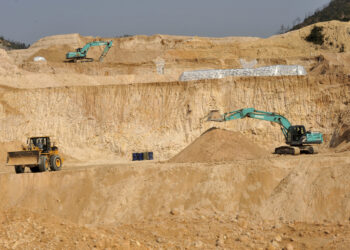«We have submitted a claim for arbitration against the Tunisian government that is three times the market value of our company.»
-Andrea Cattaneo. CEO, Zenith Energy
Leading an oil company in emerging markets requires certain skills, courage, and determination. Skills that one only acquires through years of experience operating in regions lacking the political stability enjoyed in the West. Andrea Cattaneo, the CEO and one of the founders of Zenith Energy, has a diverse background in the capital markets as a seasoned banker responsible for loans to emerging countries. In a time when the world was largely divided, and much of it was influenced by communist ideology, Andrea built his resume behind the Iron Curtain.
Vietnam, once one of the world’s poorest countries despite its abundant oil resources, desperately needed a loan to keep its economy afloat. Andrea, along with the bank he worked for, stepped in to assist. Vietnam was so impressed with the international banker that they wanted him to help export the oil they had just started producing.
After several years in the finance industry, Andrea left his life as a banker to venture into oil trading, marking his transition from finance to the oil industry.
In 2007, Andrea wanted to shift from trading to Exploration & Production (E&P) and founded Canoel, an Italian subsidiary that still generates electricity from natural gas in Italy. Later, the company changed its name to Zenith Energy.
Zenith Energy is headquartered in Vancouver, Canada, and in 2018, it was listed on the then-Merkur Markets, which is now called Euronext Growth. The company operates in various locations worldwide. With the Torrente Cigno natural gas plant, Zenith has been supplying 900 MWh of electricity per month to the Italian market. Given the Italian electricity prices in August, this corresponds to a monthly income of 103 000 Euros with last month average electricity prices. From October to December 2022, electricity prices were on average two to three times higher than today, and if Europe experiences increasing electricity prices throughout the year, revenue from electricity sales will rise accordingly. Torrente Cigno is one of six operational onshore gas production licenses in Italy. Other assets in the natural gas portfolio include a 20 percent *Working Interest (WI) in Masseria Grottavecchia, 100 percent WI in San Teodoro, 100 percent WI in Misano Adriatico, 40 percent WI in Sant Andrea, and 50 percent WI in Masseria Petrilli.
*Working Interest (WI) is a term used to describe a type of investment in oil and gas drilling operations where the investor is directly responsible for a portion of the ongoing costs related to exploration, drilling, and production. It refers to ownership of a share of production rights and the obligation to contribute to the costs and revenues associated with the project.
Tunisia
The pandemic ravaged in April 2020. There was limited global oil demand, but oil continued to flood the market. Inventories were filling up, and panic set in among traders as they realized there were no buyers for barrels they had no intention of taking delivery of. The West Texas Intermediate contract for May delivery plummeted into negative territory for the first time in history. With oil prices on their knees, Zenith Energy began acquiring assets in Tunisia during pandemic-induced sales. Several major players were looking to offload properties and oil fields. A subsidiary of the Chinese state-owned oil company CNPC, and the state-owned Kuwaiti oil company KUFPEC, among others, sold properties, oil storage facilities, concessions, and licenses to Zenith for a total of $1.6 million. These assets were estimated to be worth between $20 million and $25 million with significant development potential. Zenith was well-positioned in the North African country, and the company donated medical equipment to stand in solidarity with the Tunisian government and people in the fight against the pandemic.
After political turmoil in the country, Zenith Energy lost oil from its storage and the rights to operate in Tunisia. This had a significant negative impact on the company’s financials. Three claims totaling $78 million were filed for arbitration. These claims are several times the market value of Zenith. On June 5th, claims were submitted to the *International Centre for Settlement of Investment Disputes (ICSID), an international dispute resolution center in Washington. Tunisia’s President Kais Saied is desperate for IMF loans. If the country wants to secure loans from the IMF, existing claims against the nation must be resolved, putting pressure on Tunisia to resolve the situation with Zenith, which puts the company in a strong position.
*ICSID is the world’s leading institution dedicated to resolving international investment disputes. The institution has extensive experience in this area, as it has administered the majority of all international investment cases. States have agreed to use ICSID as a forum for dispute resolution between investors and states in most international investment agreements, as well as in many investment laws and contracts.
USA
After the political unrest in North Africa, the company decided to change its strategy. Unrest and conflicts were replaced with stability and predictability. Safe frameworks, political stability, resource value, cost of flowing barrels, and acquisition price were key factors in the equation as Zenith Energy looked toward the United States as a potential target.
On June 2, 2023, Zenith Energy reached an agreement with the oil and gas operator Stateside Energy to acquire seven producing oil wells and license blocks in Oklahoma. This was done through a Special Purpose Vehicle (SPV) called Newco. According to the agreement, a success agreement will be considered, providing Stateside with a bonus if Newco reaches production targets of 75, 125, 175, and 225 barrels per day (bpd).
Just three days after announcing the acquisition in Oklahoma, Zenith Energy’s wholly-owned subsidiary, Zena Oil & Gas, entered into a purchase agreement for 155 oil and gas wells with Beam Earth Group. The acquisition involves oil and gas licenses and producing wells in Midland, Texas. Forty-seven wells are active and produce an average of 60 bpd, but with rehabilitation, the capacity can be increased to an average of 100 bpd. The price is just over $1,000,000, with 60 percent in cash and 40 percent in shares at the average price over the five trading days following completion. The state of Texas already has a robust oil and gas infrastructure in place, with relatively low production costs, access to equipment, and industry experience.
Just two months after Zenith Energy’s first acquisition agreement, news of the third deal came. On August 3, the company announced that a binding Memorandum of Understanding (MOU) had been signed with Jala Capital Investments. The oil and gas license are located in the Midland Basin in Texas, with neighboring wells producing over 34 million barrels from over 1000 wells since the 1950s. The agreement involves Zenith being assigned 90 percent Gross Working Interest (GWI) and 67.5 percent Net Revenue Interest (NRI), with Jala Capital retaining 10 percent and also paying its share of the well completion costs. At today’s cost levels, the completion cost per well will be around $500,000, and each well is expected to produce about 60 bpd. Drilling and cementing are expected to take about seven days, plus well logging and testing, as well as the installation of production infrastructure.
«We are pleased with the growing progress in our acquisition campaign in the USA. Our goal is to complete acquisitions with significant production growth potential after conducting a thorough examination to maximize our development as a successful income-generating energy production company.»
-Andrea Cattaneo. CEO, Zenith Energy

Kazakhstan
Atyrau, located in the northeastern part of the Caspian Sea, is an oil-rich region in western Kazakhstan with large established fields such as Tengiz and Kashagan on the map. –The potential acquisition is expected to complement our business development activities in the rapidly evolving USA, confirming our ongoing strategic focus on production and development opportunities in stable jurisdictions, said Zenith Energy CEO Andrea Cattaneo when the company signed an intent agreement on September 4th in this very region. The agreement with the Kazakh oil company grants Zenith the exclusive right to survey the resources before any potential acquisition. The company has 90 days from September 4th to complete the surveys. Production is temporarily halted, but before the global pandemic, the property was producing around 600 bpd, with estimated reserves of up to 4 million barrels of oil. -The potential acquisition in Kazakhstan represents an exciting opportunity for Zenith to potentially acquire an asset with significant income-generating potential in a new jurisdiction, widely considered favorable for smaller energy production and development companies, said Zenith’s CEO after signing the agreement.
On September 15th, Zenith Energy signed its second intent agreement in Kazakhstan. The company will evaluate the resources in two oil development fields in the Kyzylorda region, located in southern Kazakhstan. Oil was discovered in the field in 2014, and *2P estimated resources are at 4.5 million barrels of oil (2P – proven and probable), but with 3P estimates going as high as 62.5 million barrels (3P – proven, probable, and possible). Zenith Energy will conduct surveys and analyses of the acquisition before a deal is finalized, with settlement through a SPA share purchase agreement by November 30, 2023.
The third and final intent agreement in Kazakhstan was announced on September 19th in a company press release. The potential acquisition is located in the oil rich Atyrau region, near the Caspian Sea, which is in the same region as the first potential acquisition in Kazakhstan. Production from the wells is temporarily halted, but before the pandemic, the wells drilled in 2008 were producing 200 bpd. Before the potential acquisition, Zenith Energy will conduct thorough analyses and surveys, with the settlement date set for November 30, 2023. 2P reserves are at 5 million barrels, registered with the Kazakhstan State Oil Balance List.
*2P reserves are the total amount of proven and probable reserves. Proven reserves are likely to be extracted, while probable reserves are less likely to be extracted than proven reserves. The sum of proven and probable reserves is represented as 2P.
3P oil reserves are the total amount of reserves that a company estimates it has access to, calculated as the sum of all proven and unproven reserves. 3P stands for proven (proven), probable (probable), and possible (possible) reserves.
Zenith Energy’s Future
«Yemen was a fantastic deal, with 8,000 bpd, but the downside in Yemen was the escalating war. Yemen does not export oil, making it uneconomical to produce and store oil. «
Andrea Cattaneo, CEO, Zenith Energy
The Yemen project had fantastic upside potential, but unfortunately, the political unrest escalated, putting an early stop to Zenith Energy’s oil production. When the company opened its office in Yemen on November 14, 2022, after discussions with local authorities in the country, Yemen was a promising prospect. Zenith Energy Netherlands, in which Zenith Energy has a 49 percent ownership stake, entered into a share purchase agreement with OMV E&P to acquire 100 percent of the outstanding share capital of OMV Yemen Block S 2, OMV Jordan Block 3-upstream, and OMV 70-upstream. Block S 2 was discovered in 1992 and started production in 2005. In 2021, S 2 produced around 7,400 bpd with a break-even cost of $28 per barrel. 1P reserves were estimated at 13.15 million barrels, and 2P reserves were estimated at 30.74 million barrels. On September 4, 2023, Zenith announced that the company terminated the agreement with OMV and received a refund of $4,323,800 USD with interest.
The Sèmè field in Benin, with 2P reserves estimated between 22 and 28 million barrels of oil and 12 billion cubic meters of gas, was a promising field that produced up to 2,000 bpd until production ceased in 1998. Due to coups and unrest in Niger spreading to Benin, Zenith decided to terminate the agreement in Benin in August 2023 after a thorough examination and evaluation of the situation.
After several years of setbacks in geopolitically unstable countries, Andrea and Zenith Energy have shifted their strategy to create shareholder value by entering into acquisition agreements in countries where political risk is lower than in other countries the company has previously operated in. The campaign in Oklahoma and Texas, where oil production infrastructure is well-established, access to expertise and equipment is readily available, and political risk is minimal, was a natural choice in Zenith’s new strategy. Kazakhstan is known for safeguarding the interests of smaller energy producers, and the development opportunities are significant. Geopolitically, Kazakhstan carries a somewhat higher risk than the USA, but the upside potential is substantial. Zenith Energy has also signed an MOU with the Ministry of Oil and Energy in South Sudan, allowing the company to negotiate the acquisition of oil and gas licenses in the country.





